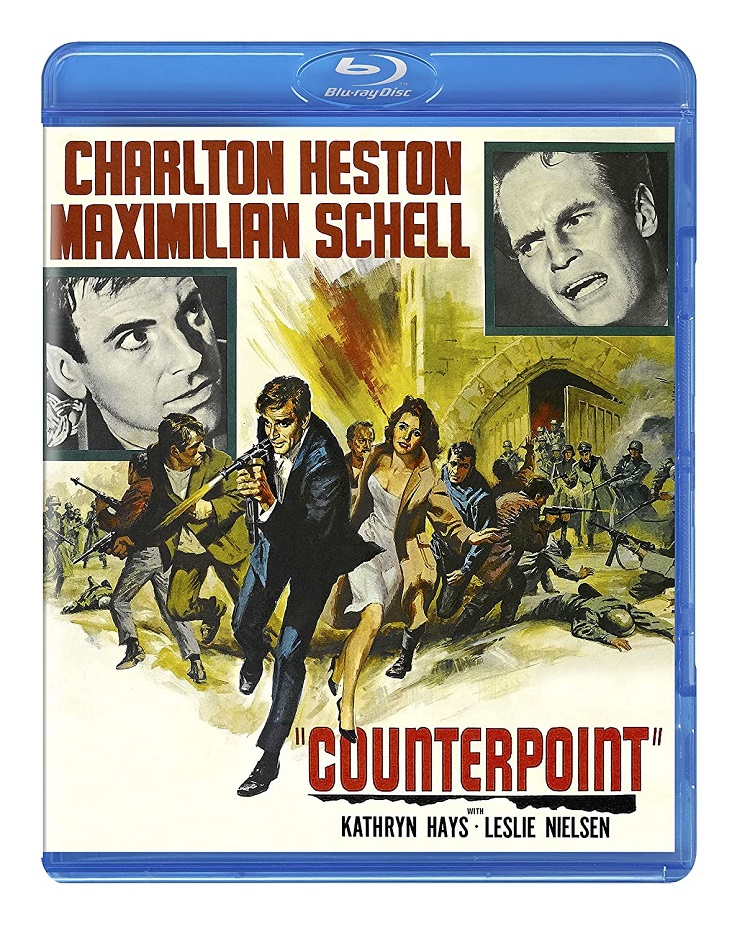
Towards the end of World War II, soldiers gather in a bombed-out church to listen to a symphony orchestra as part of a USO tour. One officer grumbles that everyone else got to see celebrities like Bob Hope or at least some dancing girls, but he gets stuck listening to some dumb orchestra. That dumb orchestra is led by Lionel Evans (Charlton Heston), who is as egotistical as he is famous. In the midst of their performance, explosions are heard nearby and an officer orders the audience to leave as the Germans are coming. Evans at first demands the symphony continues to play as no Nazi is going to bring down his performance. But before long, he must concede defeat and the 70-plus members of the symphony flee to their bus. Shortly thereafter, the bus is captured by the Nazis and brought to a small town.
The Germans have orders to execute the orchestra even though they are clearly not combatants, but as it turns out the Nazi commanding officer, General Schiller (Maximilian Schell), is a music lover and a fan of Evans. Instead of letting the firing squad have them, he demands they perform for him. Evans refuses and the film becomes a battle of wills.
Counterpoint (1968) mixes the face off between officers in The Bridge on the River Kwai (1957) with break-out attempts of The Great Escape (1963) but never comes close to capturing what makes those films so special. Heston is no Alec Guinness, and Schell’s performance pales in comparison to Sessue Hayakawa. Director Ralph Nelson handles the material well enough but it doesn’t have that spark, that something special that elevates a film to greatness.
At first, we feel that Evans is refusing to perform for Schiller for personal reasons, either ego or a simple refusal to perform for the enemy. But in time we learn that he’s stalling for time. If he can delay the performance, then perhaps he can delay their executions long enough to be rescued. His initial refusal finds him stuck inside a freezing basement while the rest of the orchestra is given better quarters in a warm church. Eventually, he joins them and even lets them rehearse, but refuses an actual performance. Schiller and the orchestra continually look for ways to convince Evans to allow the performance.
Two American soldiers were on the bus with the orchestra and must pretend to be musicians less they be immediately shot. In the film’s best scene, Nazi officer Col. Arndt (Anton Diffring) notices that one of the musicians isn’t really playing and demands a solo out of him. The results are reminiscent of my favorite scenes in Casablanca (1942) – a bit sentimental but effective. They make escape attempts while the orchestra creates enough noise to cover for them.
Leslie Nielson plays Victor Rice, Evan’s second in command. He’s fine but it’s always weird to see him in dramatic roles when he’s so famous for his comedy. Kathryn Hays plays his wife, Annabelle, the film’s only major female role. She mostly exists as a sexual bargaining chip. At first, she offers herself to Evans in order to convince him to play and later Evans pushes her onto Schiller to distract him while the soldiers try to escape.
It is a reasonably entertaining film. It is mostly well made and performed, but it cannot escape the fact that other films did what it’s doing so much better. Its central conceit with its emotional standoff over a classical music performance in the midst of a world war is goofy enough to give it bonus points, but not enough to make it any kind of classic. The music, with works from Tchaikovsky, Beethoven, Brahms, Wagner, and Schubert performed by the Los Angeles Philharmonic is a definite highlight.
Extras on this Scorpion Releasing/Kino Lorber Blu-ray included a lively audio commentary from Steve Mitchell and Steven Jay Rubin plus several trailers for this film and other Kino releases.